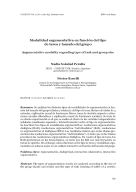Please use this identifier to cite or link to this item:
https://repositorio.uca.edu.ar/handle/123456789/6176| Título: | Modalidad argumentativa en función del tipo de tarea y tamaño del grupo Argumentative modality regarding type of task and group size |
Autor: | Peralta, Nadia Soledad Roselli, Néstor Daniel |
Palabras clave: | PSICOLOGIA; ARGUMENTACION; INTERACCION SOCIAL; ESTUDIANTES UNIVERSITARIOS; GRUPO | Fecha de publicación: | 2017 | Editorial: | Universidad Diego Portales. Centro de Estudios de la Argumentación y el Razonamiento | Cita: | Peralta, N. S., Roselli, N. (2017). Modalidad argumentativa en función del tipo de tarea y tamaño del grupo [en línea] COGENCY, 9(2). Disponible en: https://repositorio.uca.edu.ar/handle/123456789/6176 | Resumen: | Resumen: Se analizan los distintos tipos de modalidades de argumentación en función del tamaño del grupo (díadas y tríadas) y del tipo de tarea (lectura de tablas de 3 entradas, explicación causal de fenómenos físicos, toma de decisión respecto a situaciones morales dilemáticas y explicación causal de fenómenos sociales). Se trata de un diseño experimental en el que se analiza el efecto de las variables independientes señaladas (analizadas separada e interactivamente) sobre el tipo de argumentación. Se describen tres tipos de modalidades argumentativas: resoluciones argumentativas dialógicas (RAD), resoluciones argumentativas “individualistas” (RAI), resoluciones no argumentativas ni dialógicas (RNA). Los resultados indican que en las díadas predominan las resoluciones argumentativas “individualistas”; en tanto que en las tríadas prevalecen las resoluciones argumentativas dialógicas. En cuanto al tipo de tarea, las RAD predominan en las tareas lógicas, en tanto que las RAI son más frecuentes en tareas de opinión. Sin embargo, estas relaciones entre tipo de tarea y modalidad argumentativa se aclaran mejor en un análisis interactivo en función del tamaño del grupo. Abstract: The types of argumentation modes are analyzed according to the size of the group (dyads and triads) and the type of task (reading of tables of 3 entries, causal explanation of physical phenomena, decision making regarding moral dilemmatic situations and explanation cause of social phenomena). It is an experimental design in which the effect of the independent variables indicated (analyzed separately and interactively) on the type of argumentation is analyzed. Three types of argumentation are described: dialogical argumentative resolutions (RAD), “individualistic” argumentative resolutions (RAI), non-argumentative and dialogical resolutions (RNA). The results indicate that the “individualistic” argumentative resolutions prevail in dyads; while the triads prevails argumentative dialogical resolutions. Regarding the type of task, RAD predominate in logical tasks, while RAI are more frequent in opinion tasks. However, these relationships between type of evidence and argumentative modality are better clarified in an interactive analysis depending on the size of the group. |
URI: | https://repositorio.uca.edu.ar/handle/123456789/6176 | ISSN: | 0718-8285 | Disciplina: | PSICOLOGIA | Derechos: | Acceso Abierto | Fuente: | COGENCY, 9(2), 2017 |
| Appears in Collections: | Artículos |
Files in This Item:
| File | Description | Size | Format | |
|---|---|---|---|---|
| modalidad-argumentativa-funcion-tipo.pdf | 252,88 kB | Adobe PDF |  View/Open |
Page view(s)
326
checked on Apr 30, 2024
Download(s)
145
checked on Apr 30, 2024
Google ScholarTM
Check
This item is licensed under a Creative Commons License

